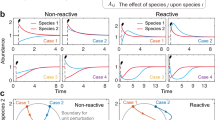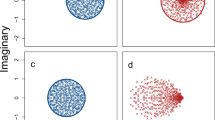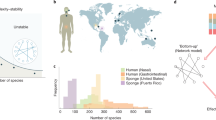Abstract
Although the relation between complexity and stability in natural systems has been widely investigated1, a number of other basic questions remain largely unstudied. For example: can we find fundamental properties which identify a persistent natural system? Are these properties due to the process by which such a system emerges? Is this process—natural selection—also responsible for that robustness which is so generally superior to that of an artificial system? This peculiar robustness of a natural system can show itself in a wide variety of ways; the resistance to shock and efficient nutrient conservation of a climax community2, for example, or the physical stability of proteinoid microparticles3. Can we find other system properties which help to explain this robustness—properties which transcend the particular type of system under consideration? Such a ‘universal’ set of requirements is indeed suggested by the results reported here. In the model studied, the survivor systems turn out to be composed, at every subsystem level, of subsystems each of which is independently viable. These viable subsystems are nested, overlapping, strongly connected and extraordinarily numerous, implying a ‘defence in depth’ for the main system against major collapse. Some important conclusions can be made about these model systems: first, an artificial system comparable in its size and complexity could hardly have this robust structure built into it; second, if grossly damaged, a natural system will usually be reduced to one of its viable subsystems. The components eliminated could, of course, include ones vital to human interests. Full restoration of the damage would not generally be practicable.
This is a preview of subscription content, access via your institution
Access options
Subscribe to this journal
Receive 51 print issues and online access
$199.00 per year
only $3.90 per issue
Buy this article
- Purchase on Springer Link
- Instant access to full article PDF
Prices may be subject to local taxes which are calculated during checkout
Similar content being viewed by others
References
May, R. M. Stability and Complexity in Model Ecosystems (Princeton University Press, 1973).
Odum, E. P. Fundamentals of Ecology (Saunders, Philadelphia, 1971).
Fox, S. W. & Dose, K. Molecular Evolution and the Origin of Life (Freeman, San Francisco, 1972).
Tregonning, K. thesis, Monash Univ. (1979).
Roberts, A. Nature 251, 607 (1974).
Tregonning, K. & Roberts, A. Nature 281, 563–564 (1979).
May, R. M. Nature 238, 413–414 (1972).
Simon, H. A. in Hierarchy Theory (Braziller, New York, 1973).
Siljak, D. D. Large-scale Dynamic Systems (North-Holland, New York, 1978).
von Bertalanffy, L. General System Theory (Braziller, New York, 1969).
Marcus, M. & Mine, H. A Survey of Matrix Theory and Matrix Inequalities (Allyn & Bacon, Boston, 1964).
Ashby, W. R. Design for a Brain (Wiley, New York, 1960).
Author information
Authors and Affiliations
Rights and permissions
About this article
Cite this article
Roberts, A., Tregonning, K. The robustness of natural systems. Nature 288, 265–266 (1980). https://doi.org/10.1038/288265a0
Received:
Accepted:
Issue Date:
DOI: https://doi.org/10.1038/288265a0
This article is cited by
-
Spatial compartmentation and food web stability
Scientific Reports (2018)
-
Multi‐faceted approaches toward unravelling complex ecological networks
Population Ecology (2015)
-
A universal transition in the robustness of evolving open systems
Scientific Reports (2014)
-
Self-organization in an ecosystem
Artificial Life and Robotics (2002)
-
The complexity and stability of ecosystems
Nature (1984)
Comments
By submitting a comment you agree to abide by our Terms and Community Guidelines. If you find something abusive or that does not comply with our terms or guidelines please flag it as inappropriate.



